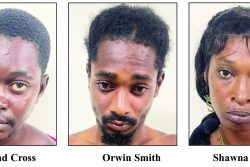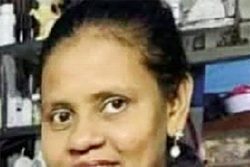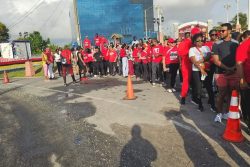Does the President need a national security adviser to analyse the abundant amount of raw information that passes through his office and to coordinate the myriad security agencies and programmes in the country?
With the recent appointment of the PPPC Administration’s fifth Minister of Home Affairs, and backed by a swollen security staff at the Office of the President that includes two former Ministers of Home Affairs – Mr Feroze Mohamed and Ms Gail Teixeira – and a former Commissioner of Police, Mr Laurie Lewis; and party apparatchik, Mr Hydar Ally, the President should be getting a daily earful of data.
Chronic security problems seem to defy solution, nevertheless, and this might mean either that the situation is deteriorating faster than solutions can be found or that the security strategy simply is not working. Down in the villages, private homes and business places are still being robbed; execution-style murders are carried out with clinical precision; public and private buildings are still being burnt and, every now and then, prisoners break out of one of the country’s rickety jails.
A raft of remedies and makeshift measures introduced over the years failed to create a safe, secure and stable environment. And, for over fourteen years and through four presidencies, Dr Roger Luncheon has provided continuity to the Administration’s security policies. He still clings to the powerful positions of chairman of the Central Intelligence Committee and secretary to the Cabinet and the Guyana Defence Board and serves as the Administration’s spokesman on security.
In addition, he holds the chairmanship of the much-criticised National Insurance Scheme and, as a member of his party’s Executive Committee, has had a busy political schedule. But, despite his expertise in administration and extensive experience in security matters, his recent hospitalisation for a chronic complaint and travels overseas for specialist medical treatment must have raised questions about short-term substitution if not long-term replacement.
The configuration of the President’s security staff and the functions of Ms Teixeira and Messrs Ally, Mohamed and Lewis are not public knowledge but, given the frequent crises and usually slow reaction by the security forces, not to mention the well-reported perennial problems such as narco-trafficking and gun-running, there is cause for concern.
Despite the crowded community of foreigners such as Peruvian and American advisers; Scottish Police College consultants; and British Scotland Yard instructors, and the importation of new concepts such as the citizen security programme and the neighbourhood police project, it is difficult to determine their impact on the lower levels where violent crime hurts the ordinary citizens first and most.
Since 1992, each President has sought to define a clear national security policy and to develop reliable institutions that reflected his personal style to manage them. But the situation was transformed by the thriving narcotics trade which introduced cash, guns and violence on an unprecedented scale. In such circumstances, the absence of national security coordination became evident especially in the out-of-control depredations of the phantom squad and the murderous excesses of rogue policemen during Mr Ronald Gajraj’s troublesome tenure at the Ministry of Home Affairs.
Given the complexity of the current situation and the challenges which lie ahead, it would be good for the President to consider organising his several advisers into a security council capable of concentrating on providing the sort of analysis that would allow a deeper and wider range of options for decision-making.







